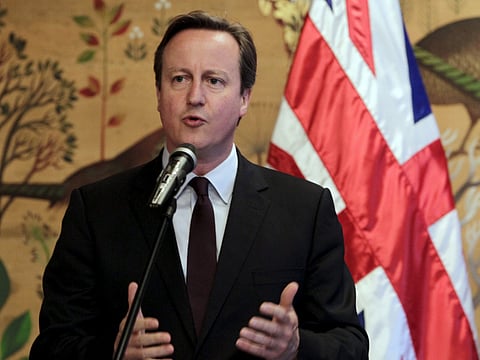British Muslims hate Daesh too
By ignoring the good work British Muslims are doing, ministers risk demoralising those who are fighting radicalisation every day

British Prime Minister David Cameron is right. Daesh (the self-proclaimed Islamic State of Iraq and the Levant) poses a massive threat — one of the biggest we face today. He is right when he describes the poisonous narrative it preaches and I welcome his comments that British Muslim communities have a powerful and important role to play in dealing with a situation that is becoming increasingly grave. As prime minister he is right to bring the authority of his office to bear.
However, what concerns me about the prime minister’s speech in Slovakia is his emphasis on one aspect of the challenge, while overlooking all the other aspects of the problem. He has apparently decided to focus on the idea that “some” in our Muslim communities condone the activities of Daesh and “perhaps” encourage young people to take the ruinous path of joining the terrorists.
Although he rightly said there are “many reasons” why young people become radicalised and then take the next step towards acting on those warped beliefs, his speech focused only on the notion of Muslim community complicity. Friday’s newspapers were also heavily briefed to that effect ahead of the speech.
The death in Iraq of Talha Asmal — Britain’s youngest suicide bomber — and the reported arrival in Syria of a family of three women and nine British children from Bradford provide a tragic backdrop against which the British government could have reached out in partnership and demanded more of its communities and itself. Theresa May’s powerful words at the Metropolitan police’s counterterrorism conference in London 24 hours before Cameron’s Bratislava speech set the right tone and delivered a graphic and frank message: That Britons must all do more and they must do it together. The prime minister would have been better advised to follow her example. He should also have been advised not to choose Bratislava as the backdrop to speak to his own British Muslim communities, but to opt for Birmingham, or dare I even suggest, Bradford. His last major speech of this type was delivered in Munich, when it could have been Manchester.
The government is aware of how disengaged it is from large sections of the British Muslim communities. So advisers would have known how this intervention, with its misguided emphasis and call to action, would at best fall on deaf ears, and at worst further alienate. I wish government ministers would come to Dewsbury. I wish they would meet the sports groups that have for years been giving youngsters a British Muslim identity and working to create a sense of belonging.
Pizza evenings
I wish they would meet the imams leading the ideological fight against Daesh, the business people who are putting their hard-earned cash into pizza evenings for children to draw them off the streets and allow them to hear the message of deradicalisation. I would have wanted them to hear the anguish of mothers who give daily lectures to their children because they so fear losing them.
Cameron and others need to come and see these initiatives and hundreds like them up and down the country. The fatwas, curriculums and conferences that unpick and reject the extremist ideology; the volunteering and charitable giving which reaches across faith communities; the Muslim guides, scouts, cadets, national citizen service graduates and volunteers who sell poppies every year; individuals who are proudly British and proudly Muslim. Ministers need to experience what the communities are already doing — and see that they are doing this not just because it is the right thing to do, but also out of a powerful instinct for self-preservation.
British Muslim communities know that it is they who are being preyed upon and targeted by the likes of Daesh. They know that this is their fight and they are fighting it. I support Cameron and the government’s battle against extremism, but lament the missed opportunities.
Fighting radicalisation
Cameron’s speech could have been used to highlight the fact that British Muslims are leading the rest of Europe in their efforts to fight radicalisation. It was the expertise of British Muslims, among others, that French policymakers turned to after the Charlie Hebdo murders. To highlight this work would have empowered, strengthened and encouraged those who are working so hard, often to personal detriment. Their efforts deserve recognition.
My concern is that this call to Muslims to do more, without an understanding of what they already do now, will demoralise the very people who will continue to lead this fight. As one prominent female Muslim activist told me: “This speech has undermined what I’ve been doing.” Cameron is right that there are “some” — a minority within a minority within a minority — who condone the Daesh view of the world, but there are so many more of this minority who are fighting a very real and sustained battle, the same battle he is fighting. They know they have to do more, they are willing to do more, but they will do it a lot better knowing we are on the same side. The British government needs to champion them, support them. Only then will it have the credibility to demand that communities themselves do more.
— Guardian News & Media Ltd
Sayeeda Warsi is a former co-chair of the Conservative party.



